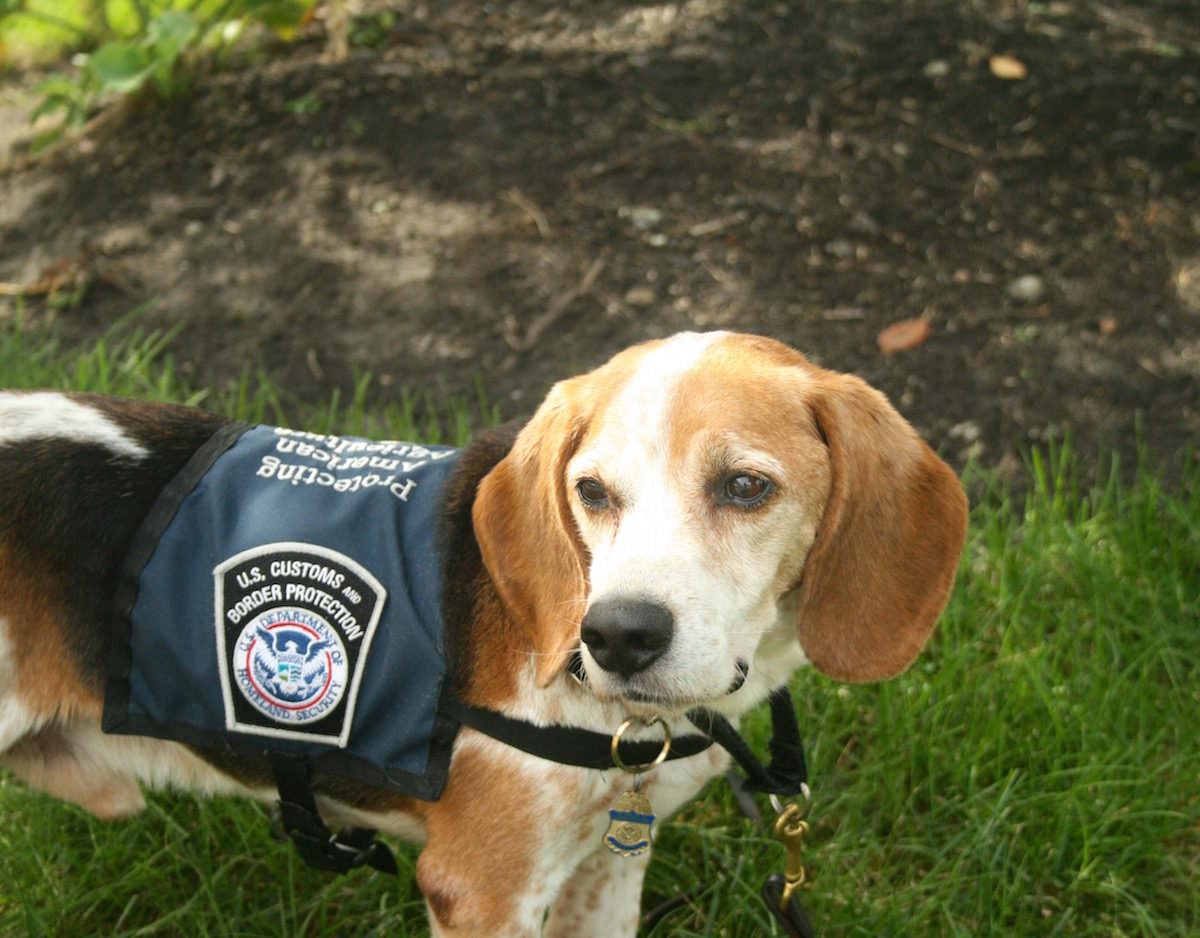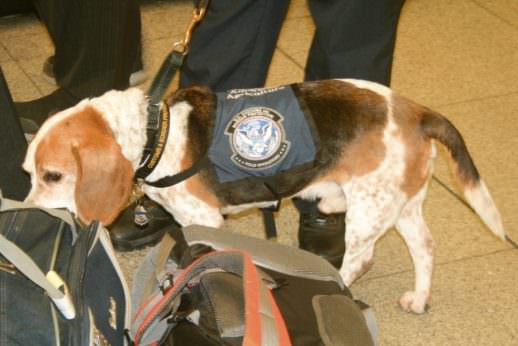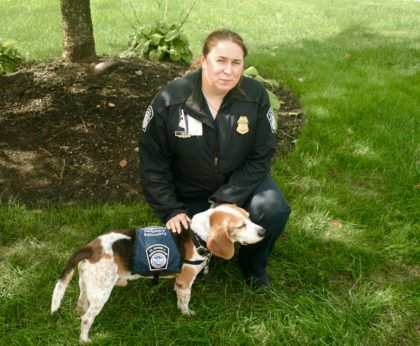Meet the Beagle Brigade: Protecting American Ag One Sniff at a Time
If you try to sneak plants, meat, or other agricultural products into the country, you’re likely to get busted by federal agents with floppy ears and wagging tails.
Meet the Beagle Brigade: Protecting American Ag One Sniff at a Time
If you try to sneak plants, meat, or other agricultural products into the country, you’re likely to get busted by federal agents with floppy ears and wagging tails.

Jasper, an eight-year-old beagle-bluetick-coonhound mix with some of the sweetest brown eyes you’ve ever seen, was a member of the Beagle Brigade, which for the last 20 years has been the front line of defense in protecting America’s food supply at our international airports. The Brigade is made up of 114 teams of dogs and their handlers, who are agricultural specialists in the U.S. Customs and Border Protection agency. Every international airport in the country has at least one team made up of a dog and its handler. Kennedy International Airport in New York City has five, plus two teams of Labrador retrievers. Terminal 4, the airport’s busiest terminal averages 50,000 passengers a day. That’s a lot of baggage potentially carrying a Pandora’s Box of invasive species.
That’s where pups like Jasper come in. Just before he retired, I hung out with Jasper and his handler, Agriculture Specialist Amanda Tripple, in Terminal 4 to watch the pair in action. Flights from Amsterdam and Japan were landing, spilling out hundreds of passengers. Tripple and Jasper unobtrusively weaved in and out of the crowds, until Jasper signaled to Tripple, either by nosing the bag or sitting, that he’d smelled something. In one case it was an apple, which was seized, and in a few other cases it was dried fruit, which is allowed in. While the dogs are trained to sit down next to the baggage when they smell contraband, Tripple and Jasper are so in synch, Tripple says, that she can immediately tell by Jasper’s subtle movements that he’s keyed in on a fruit, vegetable, or meat product.

According to Anthony Bucci, a public affairs specialist with U.S. Customs and Border Protection, the general public doesn’t always understand how important an agricultural specialist’s job is. “There is always the misperception that we’re just taking [the food] to take it or that we’re bringing it home and eating it,” he says. In reality, everything that’s confiscated gets ground down or incinerated. The idea is to keep any of this stuff from getting out of the airport and onto farms in the United States, because when invasive species do make it in, devastating consequences often result. Take, for example, the giant African snail that has been eating its way through Florida cropland, the emerald ash borer, an insect from Asia that has been decimating white ash trees in various parts of the country, and the Asian citrus psyllid, which attacks citrus trees.
“If we’re seizing a salami, an apple, or an orange, we’re doing that to protect the public. We’re protecting American agriculture. We work for the farmer,” says Border Protection Agriculture K-9 Supervisor James Armstrong, one of the founders of the Beagle Brigade. “If one of these pests get into the country it could mean no longer being able to grow some agricultural products. American farmers don’t only feed us, they feed the world.”
While federal agencies like the DEA and TSA rely on bigger dogs, like German shepherds, to sniff out drugs and explosives, the U.S. Customs and Border Protection agency uses beagles for their great sense of smell, high food drive, and more importantly, their gentle demeanor, an important factor when they’re at close quarters with thousands of passengers a day. “It’s a friendly breed. We’re in and out of the passengers. It’s just easier to use that type of dog,” says Tripple. “One time I had a little girl scream ‘Snoopy’ from across the terminal. She ran over, slid on her knees and was hugging Jasper. It was the cutest thing.”
The dogs in the Beagle Brigade all come from either shelters, rescues, or from private homes where the owners can no longer care for them for various reasons. That was the situation with Jasper who has been a federal agent (with his very own badge) since he was around three and began working with Tripple. The dogs and their handlers stay together throughout the dog’s career, never switching partners. The training period lasts three months, and the canine graduates come to work knowing five basic scents: beef, pork, citrus, mango, and apple. They quickly learn other scents by association and build up a repertoire of more than a hundred, including being able to sniff out such exotic produce as starfruit.
Jasper has sniffed out live turtles, bear meat, whale meat, a cooked bat, and even an entire goat head found in passenger’s baggage. More importantly, he located a plant with an invasive insect species on it, a find that ended up helping to change the federal regulation concerning importing citrus from the Dominican Republic into the U.S., says Tripple. Most of the time he sniffs out less exotic things like bananas and apples that passengers have forgotten they had with them, but in other instances it’s contraband meat, seeds, and plants people are actively trying to sneak in for themselves or to sell.
“Once Jasper found a pig leg tied to the side of a bag. They told me it was a tennis racket and had wrapped it to look like one,” Tripple says. “I couldn’t understand why Jasper wouldn’t stop digging at it until I realized what it really was.”

In Jasper’s heyday he could sniff out 20 to 30 hits, but he has slowed down to between 10 and 15, so he’s been retired from the Brigade. Tripple says the mandatory retirement age is eight and although they could probably go beyond that age, the agency wants the dogs to have a life outside of the airport. Some dogs retire early if they no longer seem to be enjoying the job or if they have health issues. The handler gets first choice for adopting their canine partner, and if they can’t do it, there are many other handlers willing to take the pups home.
“I’m absolutely taking him. That’s my baby,” says Tripple. “It’s going to be a big transition for me. I’m looking forward to working with a new dog but I’m going to miss not having Jasper as my partner everyday even though I’ll get to see him at home. He’s going to transition perfectly. My cats on the other hand…”
Follow us
This work is licensed under a Creative Commons Attribution-NoDerivatives 4.0 International License.
Want to republish a Modern Farmer story?
We are happy for Modern Farmer stories to be shared, and encourage you to republish our articles for your audience. When doing so, we ask that you follow these guidelines:
Please credit us and our writers
For the author byline, please use “Author Name, Modern Farmer.” At the top of our stories, if on the web, please include this text and link: “This story was originally published by Modern Farmer.”
Please make sure to include a link back to either our home page or the article URL.
At the bottom of the story, please include the following text:
“Modern Farmer is a nonprofit initiative dedicated to raising awareness and catalyzing action at the intersection of food, agriculture, and society. Read more at <link>Modern Farmer</link>.”
Use our widget
We’d like to be able to track our stories, so we ask that if you republish our content, you do so using our widget (located on the left hand side of the article). The HTML code has a built-in tracker that tells us the data and domain where the story was published, as well as view counts.
Check the image requirements
It’s your responsibility to confirm you're licensed to republish images in our articles. Some images, such as those from commercial providers, don't allow their images to be republished without permission or payment. Copyright terms are generally listed in the image caption and attribution. You are welcome to omit our images or substitute with your own. Charts and interactive graphics follow the same rules.
Don’t change too much. Or, ask us first.
Articles must be republished in their entirety. It’s okay to change references to time (“today” to “yesterday”) or location (“Iowa City, IA” to “here”). But please keep everything else the same.
If you feel strongly that a more material edit needs to be made, get in touch with us at [email protected]. We’re happy to discuss it with the original author, but we must have prior approval for changes before publication.
Special cases
Extracts. You may run the first few lines or paragraphs of the article and then say: “Read the full article at Modern Farmer” with a link back to the original article.
Quotes. You may quote authors provided you include a link back to the article URL.
Translations. These require writer approval. To inquire about translation of a Modern Farmer article, contact us at [email protected]
Signed consent / copyright release forms. These are not required, provided you are following these guidelines.
Print. Articles can be republished in print under these same rules, with the exception that you do not need to include the links.
Tag us
When sharing the story on social media, please tag us using the following: - Twitter (@ModFarm) - Facebook (@ModernFarmerMedia) - Instagram (@modfarm)
Use our content respectfully
Modern Farmer is a nonprofit and as such we share our content for free and in good faith in order to reach new audiences. Respectfully,
No selling ads against our stories. It’s okay to put our stories on pages with ads.
Don’t republish our material wholesale, or automatically; you need to select stories to be republished individually.
You have no rights to sell, license, syndicate, or otherwise represent yourself as the authorized owner of our material to any third parties. This means that you cannot actively publish or submit our work for syndication to third party platforms or apps like Apple News or Google News. We understand that publishers cannot fully control when certain third parties automatically summarize or crawl content from publishers’ own sites.
Keep in touch
We want to hear from you if you love Modern Farmer content, have a collaboration idea, or anything else to share. As a nonprofit outlet, we work in service of our community and are always open to comments, feedback, and ideas. Contact us at [email protected].by Andrew Amelinckx, Modern Farmer
October 12, 2016
Modern Farmer Weekly
Solutions Hub
Innovations, ideas and inspiration. Actionable solutions for a resilient food system.
ExploreExplore other topics
Share With Us
We want to hear from Modern Farmer readers who have thoughtful commentary, actionable solutions, or helpful ideas to share.
SubmitNecessary cookies are absolutely essential for the website to function properly. This category only includes cookies that ensures basic functionalities and security features of the website. These cookies do not store any personal information.
Any cookies that may not be particularly necessary for the website to function and are used specifically to collect user personal data via analytics, ads, other embedded contents are termed as non-necessary cookies.
Enjoyed article on Beagle Brigade.